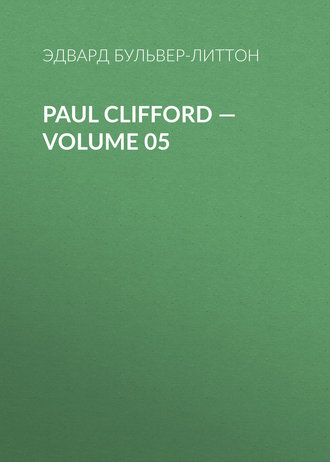
Эдвард Бульвер-Литтон
Paul Clifford — Volume 05
As soon as he had recovered his self-possession, Sir William made question of his niece; and finding that after an unrelaxing watch during the whole of the squire's brief illness, nature had failed her at his death, and she had been borne senseless from his chamber to her own, Brandon walked with a step far different from his usual stately gait to the room where his brother lay. It was one of the oldest apartments in the house, and much of the ancient splendour that belonged to the mansion ere its size had been reduced, with the fortunes of its successive owners, still distinguished the chamber. The huge mantelpiece ascending to the carved ceiling in grotesque pilasters, and scroll-work of the blackest oak, with the quartered arms of Brandon and Saville escutcheoned in the centre; the panelled walls of the same dark wainscot; the armorie of ebony; the high-backed chairs, with their tapestried seats; the lofty bed, with its hearse-like plumes and draperies of a crimson damask that seemed, so massy was the substance and so prominent the flowers, as if it were rather a carving than a silk,—all conspired with the size of the room to give it a feudal solemnity, not perhaps suited to the rest of the house, but well calculated to strike a gloomy awe into the breast of the worldly and proud man who now entered the death-chamber of his brother.
Silently William Brandon motioned away the attendants, and silently he seated himself by the bed, and looked long and wistfully upon the calm and placid face of the deceased. It is difficult to guess at what passed within him during the space of time in which he remained alone in that room. The apartment itself he could not at another period have tenanted without secret emotion. It was that in which, as a boy, he had himself been accustomed to sleep; and, even then a schemer and an aspirant, the very sight of the room sufficed to call back all the hopes and visions, the restless projects and the feverish desires, which had now brought him to the envied state of an acknowledged celebrity and a shattered frame. There must have been something awful in the combination of those active remembrances with the cause which had led him to that apartment; and there was a homily in the serene countenance of the dead, which preached more effectually to the heart of the living than William Brandon would ever have cared to own. He had been more than an hour in the room, and the evening had already begun to cast deep shadows through the small panes of the half-closed window, when Brandon was startled by a slight noise. He looked up, and beheld Lucy opposite to him. She did not see him; but throwing herself upon the bed, she took the cold hand of the deceased, and after a long silence burst into a passion of tears.
"My father!" she sobbed,—"my kind, good father! who will love me now?"
"I!" said Brandon, deeply affected; and passing round the bed, he took his niece in his arms: "I will be your father, Lucy, and you—the last of our race—shall be to me as a daughter!"
CHAPTER XXV
Falsehood in him was not the useless lie
Of boasting pride or laughing vanity:
It was the gainful, the persuading art, etc.
CRABBE.
On with the horses—off to Canterbury,
Tramp, tramp o'er pebble, and splash, splash thro' puddle;
Hurrah! how swiftly speeds the post so merry!
. . . . . . . . . . . . . . .
"Here laws are all inviolate: none lay
Traps for the traveller; every highway's clear;
Here—" he was interrupted by a knife,
With "D—-your eyes! your money or your life!"
Don Juan.
Misfortunes are like the creations of Cadmus,—they destroy one another! Roused from the torpor of mind occasioned by the loss of her lover at the sudden illness of the squire, Lucy had no thought for herself, no thought for any one, for anything but her father, till long after the earth had closed over his remains. The very activity of the latter grief was less dangerous than the quiet of the former; and when the first keenness of sorrow passed away, and her mind gradually and mechanically returned to the remembrance of Clifford, it was with an intensity less strong, and less fatal to her health and happiness than before. She thought it unnatural and criminal to allow anything else to grieve her, while she had so sacred a grief as that of her loss; and her mind, once aroused into resistance to passion, betrayed a native strength little to have been expected from her apparent character. Sir William Brandon lost no time in returning to town after the burial of his brother. He insisted upon taking his niece with him; and, though with real reluctance, she yielded to his wishes, and accompanied him. By the squire's will, indeed, Sir William was appointed guardian to Lucy, and she yet wanted more than a year of her majority. Brandon, with a delicacy very uncommon to him where women (for he was a confirmed woman-hater) were concerned, provided everything that he thought could in any way conduce to her comfort. He ordered it to be understood in his establishment that she was its mistress. He arranged and furnished, according to what he imagined to be her taste, a suite of apartments for her sole accommodation; a separate carriage and servants were appropriated to her use; and he sought, by perpetual presents of books or flowers or music, to occupy her thoughts, and atone for the solitude to which his professional duties obliged him so constantly to consign her. These attentions, which showed this strange man in a new light, seemed to bring out many little latent amiabilities, which were usually imbedded in the callosities of his rocky nature; and, even despite her causes for grief and the deep melancholy which consumed her, Lucy was touched with gratitude at kindness doubly soothing in one who, however urbane and polished, was by no means addicted to the little attentions that are considered so gratifying by women, and yet for which they so often despise, while they like, him who affords them. There was much in Brandon that wound itself insensibly around the heart. To one more experienced than Lucy, this involuntary attraction might not have been incompatible with suspicion, and could scarcely have been associated with esteem; and yet for all who knew him intimately, even for the penetrating and selfish Mauleverer, the attraction existed. Unprincipled, crafty, hypocritical, even base when it suited his purpose; secretly sneering at the dupes he made, and knowing no code save that of interest and ambition; viewing men only as machines, and opinions only as ladders,— there was yet a tone of powerful feeling sometimes elicited from a heart that could at the same moment have sacrificed a whole people to the pettiest personal object: and sometimes with Lucy the eloquence or irony of his conversation deepened into a melancholy, a half-suppressed gentleness of sentiment, that accorded with the state of her own mind and interested her kind feelings powerfully in his. It was these peculiarities in his converse which made Lucy love to hear him; and she gradually learned to anticipate with a gloomy pleasure the hour in which, after the occupations of the day, he was accustomed to join her.
"You look unwell, uncle, to-night," she said, when one evening he entered the room with looks more fatigued than usual; and rising, she leaned tenderly over him, and kissed his forehead.
"Ay!" said Brandon, utterly unwon by, and even unheeding, the caress, "our way of life soon passes into the sear and yellow leaf; and when Macbeth grieved that he might not look to have that which should accompany old age, he had grown doting, and grieved for what was worthless."
"Nay, uncle, 'honour, love, obedience, troops of friends,' these surely were worth the sighing for?"
"Pooh! not worth a single sigh! The foolish wishes we form in youth have something noble and something bodily in them; but those of age are utter shadows, and the shadows of pygmies! Why, what is honour, after all? What is this good name among men? Only a sort of heathenish idol, set up to be adored by one set of fools and scorned by another. Do you not observe, Lucy, that the man you hear most praised by the party you meet to-day is most abused by that which you meet to-morrow? Public men are only praised by their party; and their party, sweet Lucy, are such base minions that it moves one's spleen to think one is so little as to be useful to them. Thus a good name is only the good name of a sect, and the members of that sect are only marvellous proper knaves."
"But posterity does justice to those who really deserve fame."
"Posterity! Can you believe that a man who knows what life is cares for the penny whistles of grown children after his death? Posterity, Lucy,— no! Posterity is but the same perpetuity of fools and rascals; and even were justice desirable at their hands, they could not deal it. Do men agree whether Charles Stuart was a liar or a martyr? For how many ages have we believed Nero a monster! A writer now asks, as if demonstrating a problem, what real historian could doubt that Nero was a paragon? The patriarchs of Scripture have been declared by modern philosophy to be a series of astronomical hieroglyphs; and, with greater show of truth, we are assured that the patriot Tell never existed! Posterity! the word has gulled men enough without my adding to the number. I, who loathe the living, can scarcely venerate the unborn. Lucy, believe me that no man can mix largely with men in political life, and not despise everything that in youth he adored! Age leaves us only one feeling,—contempt!"
"Are you belied, then?" said Lucy, pointing to a newspaper, the organ of the party opposed to Brandon: "are you belied when you are here called 'ambitious'? When they call you 'selfish' and 'grasping,' I know they wrong you; but I confess that I have thought you ambitious; yet can he who despises men desire their good opinion?"
"Their good opinion!" repeated Brandon, mockingly: "do we want the bray of the asses we ride? No!" he resumed, after a pause. "It is power, not honour; it is the hope of elevating oneself in every respect, in the world without as well as in the world of one's own mind: it is this hope which makes me labour where I might rest, and will continue the labour to my grave. Lucy," continued Brandon, fixing his keen eyes on his niece, "have you no ambition,—have power and pomp and place no charm for your mind?"
"None!" said Lucy, quietly and simply.
"Indeed! yet there are times when I have thought I recognized my blood in your veins. You are sprung from a once noble, but a fallen race. Are you ever susceptible to the weakness of ancestral pride?"
"You say," answered Lucy, "that we should care not for those who live after us; much less, I imagine, should we care for those who have lived ages before!"
"Prettily answered," said Brandon, smiling. "I will tell you at one time or another what effect that weakness you despise already once had, long after your age, upon me. You are early wise on some points; profit by my experience, and be so on all."
"That is to say, in despising all men and all things!" said Lucy, also smiling.
"Well, never mind my creed,—you may be wise after your own; but trust one, dearest Lucy, who loves you purely and disinterestedly, and who has weighed with scales balanced to a hair all the advantages to be gleaned from an earth in which I verily think the harvest was gathered before we were put into it,—trust me, Lucy, and never think love, that maiden's dream, so valuable as rank and power: pause well before you yield to the former; accept the latter the moment they are offered you. Love puts you at the feet of another, and that other a tyrant; rank puts others at your feet, and all those thus subjected are your slaves!"
Lucy moved her chair so that the new position concealed her face, and did not answer; and Brandon, in an altered tone, continued,—
"Would you think, Lucy, that I once was fool enough to imagine that love was a blessing, and to be eagerly sought for? I gave up my hopes, my chances of wealth, of distinction,—all that had burned from the years of boyhood into my very heart. I chose poverty, obscurity, humiliation; but I chose also love. What was my reward? Lucy Brandon, I was deceived,— deceived!"
Brandon paused; and Lucy took his hand affectionately, but did not break the silence. Brandon resumed:—
"Yes, I was deceived! But I in my turn had a revenge, and a fitting revenge; for it was not the revenge of hatred, but" (and the speaker laughed sardonically) "of contempt. Enough of this, Lucy! What I wished to say to you is this,—grown men and women know more of the truth of things than ye young persons think for. Love is a mere bauble, and no human being ever exchanged for it one solid advantage without repentance. Believe this; and if rank ever puts itself under those pretty feet, be sure not to spurn the footstool."
So saying, with a slight laugh, Brandon lighted his chamber candle, and left the room for the night.
As soon as the lawyer reached his own apartment, he indited to Lord Mauleverer the following epistle:
"Why, dear Mauleverer, do you not come to town? I want you, your party wants you; perhaps the K—g wants you; and certainly, if you are serious about my niece, the care of your own love-suit should induce you yourself to want to come hither. I have paved the way for you; and I think, with a little management, you may anticipate a speedy success. But Lucy is a strange girl; and, perhaps, after all, though you ought to be on the spot, you had better leave her as much as possible in my hands. I know human nature, Mauleverer, and that knowledge is the engine by which I will work your triumph. As for the young lover, I am not quite sure whether it be not better for our sake that Lucy should have experienced a disappointment on that score; for when a woman has once loved, and the love is utterly hopeless, she puts all vague ideas of other lovers altogether out of her head; she becomes contented with a husband whom she can esteem! Sweet canter! But you, Mauleverer, want Lucy to love you! And so she will—after you have married her! She will love you partly from the advantages she derives from you, partly from familiarity (to say nothing of your good qualities). For my part, I think domesticity goes so far that I believe a woman always inclined to be affectionate to a man whom she has once seen in his nightcap. However, you should come to town; my poor brother's recent death allows us to see no one,—the coast will be clear from rivals; grief has softened my niece's heart; in a word, you could not have a better opportunity. Come!
"By the way, you say one of the reasons which made you think ill of this Captain Clifford was your impression that in the figure of one of his comrades you recognized something that appeared to you to resemble one of the fellows who robbed you a few months ago. I understand that at this moment the police are in active pursuit of three most accomplished robbers; nor should I be at all surprised if in this very Clifford were to be found the leader of the gang, namely, the notorious Lovett. I hear that the said leader is a clever and a handsome fellow, of a gentlemanlike address, and that his general associates are two men of the exact stamp of the worthies you have so amusingly described to me. I heard this yesterday from Nabbem, the police-officer with whom I once scraped acquaintance on a trial; and in my grudge against your rival, I hinted at my suspicion that he, Captain Clifford, might not impossibly prove this Rinaldo Rinaldini of the roads. Nabbem caught at my hint at once; so that, if it be founded on a true guess, I may flatter my conscience as well as my friendship by the hope that I have had some hand in hanging this Adonis of my niece's. Whether my guess be true or not, Nabbem says he is sure of this Lovett; for one of his gang has promised to betray him. Hang these aspiring dogs! I thought treachery was confined to politics; and that thought makes me turn to public matters, in which all people are turning with the most edifying celerity. . . ."
Sir William Brandon's epistle found Mauleverer in a fitting mood for Lucy and for London. Our worthy peer had been not a little chagrined by Lucy's sudden departure from Bath; and while in doubt whether or not to follow her, the papers had informed him of the squire's death. Mauleverer, being then fully aware of the impossibility of immediately urging his suit, endeavoured, like the true philosopher he was, to reconcile himself to his hope deferred. Few people were more easily susceptible of consolation than Lord Mauleverer. He found an agreeable lady, of a face more unfaded than her reputation, to whom he intrusted the care of relieving his leisure moments from ennui; and being a lively woman, the confidante discharged the trust with great satisfaction to Lord Mauleverer, for the space of a fortnight, so that he naturally began to feel his love for Lucy gradually wearing away, by absence and other ties; but just as the triumph of time over passion was growing decisive, the lady left Bath in company with a tall guardsman, and Mauleverer received Brandon's letter. These two events recalled our excellent lover to a sense of his allegiance; and there being now at Bath no particular attraction to counterbalance the ardour of his affection, Lord Mauleverer ordered the horses to his carriage, and attended only by his valet, set out for London.
Nothing, perhaps, could convey a better portrait of the world's spoiled darling than a sight of Lord Mauleverer's thin, fastidious features, peering forth through the closed window of his luxurious travelling- chariot; the rest of the outer man being carefully enveloped in furs, half-a-dozen novels strewing the seat of the carriage, and a lean French dog, exceedingly like its master, sniffing in vain for the fresh air, which, to the imagination of Mauleverer, was peopled with all sorts of asthmas and catarrhs! Mauleverer got out of his carriage at Salisbury, to stretch his limbs, and to amuse himself with a cutlet. Our nobleman was well known on the roads; and as nobody could be more affable, he was equally popular. The officious landlord bustled into the room, to wait himself upon his lordship and to tell all the news of the place.
"Well, Mr. Cheerly," said Mauleverer, bestowing a penetrating glance on his cutlet, "the bad times, I see, have not ruined your cook."
"Indeed, my lord, your lordship is very good, and the times, indeed, are very bad,—very bad indeed. Is there enough gravy? Perhaps your lordship will try the pickled onions?"
"The what? Onions!—oh! ah! nothing can be better; but I never touch them. So, are the roads good?"
"Your lordship has, I hope, found them good to Salisbury?"
"Ah! I believe so. Oh! to be sure, excellent to Salisbury. But how are they to London? We have had wet weather lately, I think!"
"No, my lord. Here the weather has been dry as a bone."
"Or a cutlet!" muttered Mauleverer; and the host continued,—
"As for the roads themselves, my lord, so far as the roads are concerned, they are pretty good, my lord; but I can't say as how there is not something about them that might be mended."







